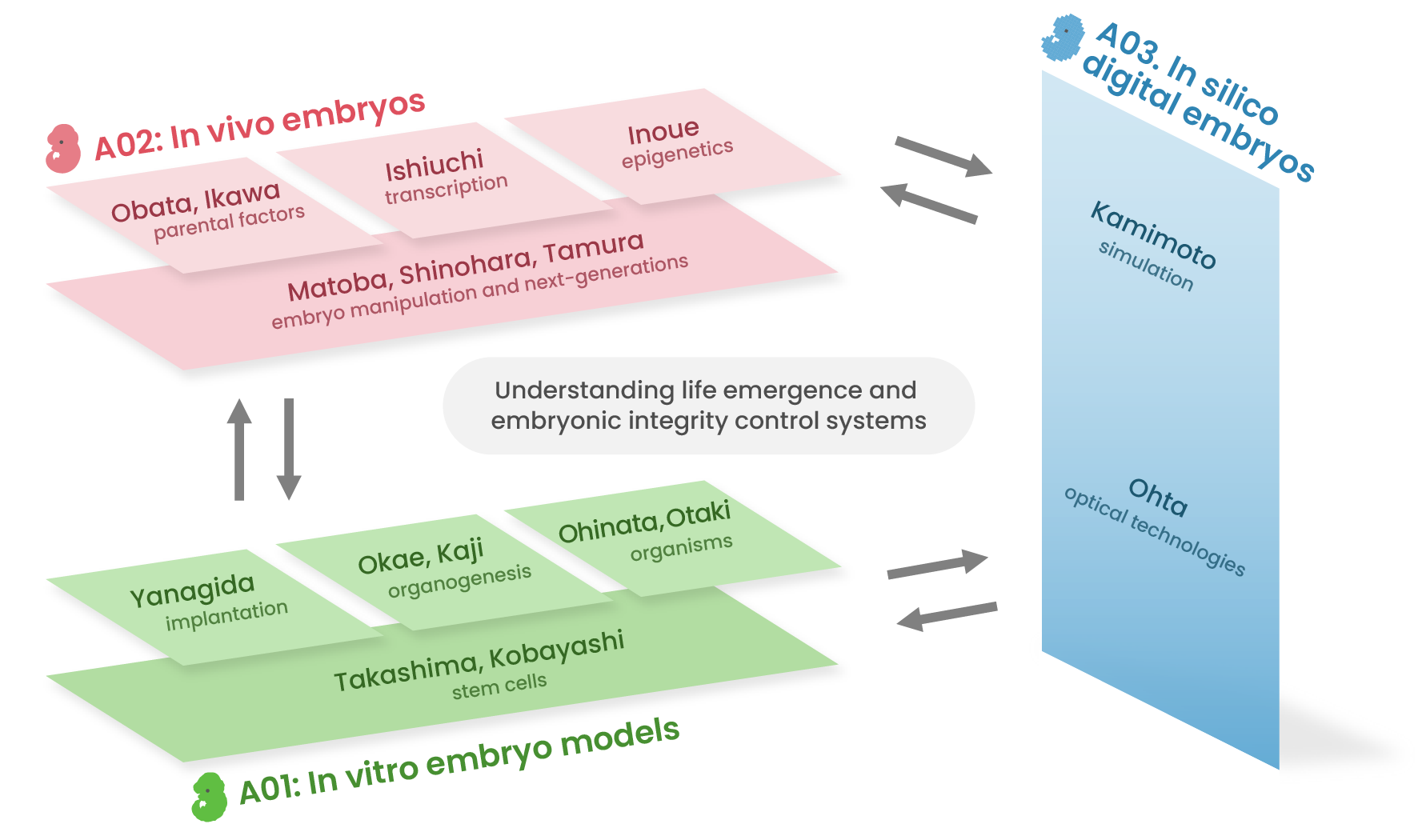Overview of the “Next-generation Developmental Bioengineering” Research Group
The fundamental question of how an apparently simple cluster of cells develops into a living organism remains unresolved. In recent years, it has become possible to generate reconstructed embryos—referred to as stem cell-derived embryo models (in vitro embryo models)—that mimic early pre- and post-implantation development using only stem cells in vitro. This breakthrough opens new avenues for investigating early human embryogenesis, which has long been challenging due to ethical and technical limitations.
However, all in vitro embryo models reported to date arrest shortly after implantation and fail to undergo organogenesis. This suggests that current in vitro embryo models lack the embryonic integrity control systems inherent to in vivo embryos generated by normal fertilization.
This research area aims to utilize in vitro embryo models to constructively elucidate the principles of life emergence, wherein a collective of cells functions and develops as a living entity. To systematically understand both life emergence and embryonic integrity control systems, we will employ cutting-edge technologies—such as omics-based analyses of intercellular interactions and transcription factor networks, single-cell profiling, and advanced optical measurements—to perform multidimensional and large-scale analyses. Based on the acquired data, we will construct digital embryo models to enable in silico simulations predicting the key factors driving life emergence.
Simulation of cell fate changes
Our Research Strategy
The primary objective of the Next-generation Developmental Bioengineering research area is to constructively understand the mechanisms by which life emerges from small clusters of cells and is perpetuated across generations. While in vitro embryo models reconstructed from stem cells exhibit morphological and transcriptional similarities to in vivo embryos, they do not harbor life.
In Project A01, we will analyze both the foundational stem cells and the derived in vitro embryo models from the perspectives of implantation, organogenesis, and organismal formation.
In Project A02, using life-containing in vivo embryos, we aim to elucidate the embryonic integrity control systems through the analysis of maternal and paternal factors, transcriptional programs, epigenomic landscapes, and advanced embryological manipulations.
To approach the essence of life, these two contrasting research streams—A01 and A02—will be integrated into a unified framework. To support this integration, Project A03 will introduce state-of-the-art digital science methodologies capable of capturing and predicting the underlying biological principles. A03 will construct digital embryo models and perform in silico simulations based on the multimodal datasets generated through A01 and A02 using advanced measurement technologies.
Through the synergistic integration of these three projects, a feedback loop of data acquisition, interpretation, and prediction will be established, ultimately enabling a deeper understanding of both life emergence and the systems that ensure embryonic integrity.

Objectives of Our Research Group
In Project A01, we aim to establish stem cells that closely resemble in vivo embryos and use them to construct advanced in vitro embryo models. These models will be utilized to identify the key cellular and molecular mechanisms underlying successful implantation and subsequent embryonic development. Furthermore, we will refine these models to replicate human organogenesis in vitro. In parallel, using model organisms, we will explore the potential of in vitro embryo models to recapitulate in vivo development. Ultimately, this project seeks to establish in vitro embryo models with true developmental potential and emergent life-like properties, evaluate their similarity to in vivo embryos, and contribute to elucidating the principles of life emergence.
In Project A02, we will elucidate the intrinsic molecular mechanisms within fertilized embryos that ensure proper development beyond implantation. Additionally, we aim to develop novel reproductive engineering technologies that secure intergenerational safety. Through analyses of parental factors, transcriptional programs, epigenomic states, and embryological manipulations across developmental stages, we will define the embryonic integrity control systems embedded in in vivo embryos. Comparative analysis with in vitro embryo models will reveal their latent deficiencies and inform strategies to overcome them.
In Project A03, we will perform large-scale and multimodal measurements of both in vivo embryos and in vitro embryo models to construct digital embryo models. These models will serve as predictive simulators composed of three modules: (1) gene and epigenomic regulation, (2) spatiotemporal cellular dynamics, and (3) responses to perturbations. By leveraging in silico data analysis, we aim to identify the key elements that enable cellular assemblies to function as living systems and undergo development, thereby deepening our understanding of life emergence.
